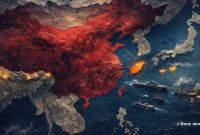Khamenei: ‘Battle Begins’—Trump Calls for Iran’s Surrender

As the conflict between Israel and Iran rages into its sixth day, the world watches with trepidation as the region is swept by a torrent of missiles, political threats, and digital warfare. At the heart of this crisis is an unmistakable shift: Iran’s leadership is embracing an uncompromising posture, while the United States, under President Donald Trump, weighs direct intervention with both words and weapons.
Khamenei Declares Open War
Iran’s Supreme Leader, Ayatollah Ali Khamenei, broke dawn on Wednesday with a stark declaration: “The battle begins.” His post on X (formerly Twitter) signaled a calculated escalation, invoking the legacy of Imam Ali—an icon of Shi’a resistance—to rally Iranians against what he labeled the “terrorist Zionist regime.” “We will show the Zionists no mercy,” Khamenei’s English-language account echoed, marking a rhetorical hardening that paralleled the thunder of Iranian missiles streaking across the skies over the West Bank and Israel.
Iran’s state-affiliated Mehr News Agency claimed that Fattah hypersonic missiles—capable, according to Tehran, of evading most conventional defenses—were launched toward Israeli targets. Although CNN and international observers could not independently verify the deployment of these specific weapons, Israeli cities have endured relentless barrages. Residents of Tel Aviv and surrounding areas again sought shelter as air raid sirens blared and Israel’s Iron Dome and US-supplied THAAD systems intercepted incoming threats.
Civilians Amid the Crossfire
Inside Iran, the mood is tense and defiant. Reports from Tehran describe the city braced under the whine of sirens and the boom of anti-aircraft fire. Social media crackled with urgent messages, as authorities warned citizens against using location-based apps like WhatsApp and Telegram—allegedly to prevent Israeli targeting. Nevertheless, many Iranians refused to be cowed, their encrypted messages painting a portrait of a society under siege but unwilling to yield.
Across the border, Israel ramped up strikes in Tehran, issuing warnings for civilians in the Iranian capital’s District 18 to evacuate before anticipated military operations. The devastation is real: more than 224 reported dead in Iran and 24 in Israel, with hundreds more wounded or displaced. The psychological toll—on both sides of the divide—continues to mount.
Trump’s Warning: “Unconditional Surrender”
In Washington, the crisis has catapulted President Donald Trump to center stage. His rhetoric has grown increasingly hawkish. “We now have complete and total control of the skies over Iran,” he proclaimed on Truth Social, calling Khamenei an “easy target” and warning that America’s “patience is wearing thin.” In a single, jarring sentence, he demanded Iran’s “UNCONDITIONAL SURRENDER.”
Trump convened his national security team in the White House Situation Room, sources confirmed, spending over an hour considering options—including US military strikes on Iranian nuclear facilities. While some advisers urge a measured approach, others report Trump is “warming” to the idea of direct intervention, particularly after consultations with Israeli Prime Minister Benjamin Netanyahu. The presence of over 30 US aerial refueling tankers in the region signals a readiness for escalation should diplomacy fail.
International Repercussions and the Human Cost
The conflict’s shockwaves extend far beyond the immediate theater of war. Oil prices soared to five-month highs, stirring fears of global economic disruption. The US Embassy in Jerusalem, citing security concerns, closed its doors for three days, advising staff and families to shelter in place. Meanwhile, European leaders, including French President Emmanuel Macron, warned against seeking regime change in Iran by force, cautioning it would “lead to chaos.”
Technology, too, has become a battleground. Iran accuses Israel of launching a “widespread cyber war” against its digital infrastructure, while WhatsApp and Meta publicly resisted the regime’s calls to shut down their services, defending their encryption and user privacy.
A Conflict with No Easy Exit
As night falls over the Middle East, the question of what comes next looms larger than ever. Iran’s leadership, battered but unbowed, vows to fight on. The United States stands at a crossroads—its president torn between military action and diplomatic pressure. For ordinary Iranians and Israelis alike, the search for safety continues beneath the specter of another day’s violence.
The world holds its breath as each side tests the limits of resolve, technology, and human endurance—hoping, against mounting evidence, for a way out before the cycle of escalation becomes irreversible.
Donald Trump Israel Ayatollah Ali Khamenei



![From Kathmandu to the World: How Excel Students Are Winning Big [Admission Open]](https://www.nepalaaja.com/img/70194/medium/excel-college-info-eng-nep-2342.jpg)
